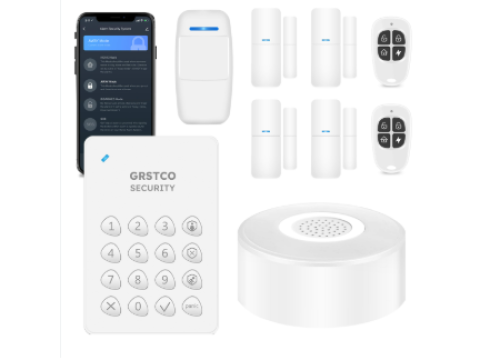Wireless Home Security Systems
Wireless security systems offer a modern, flexible solution for protecting your home. These systems utilize wireless data transmission in various ways:
- Internal Communication: Between sensors and control panels within the property.
- External Communication: From the system module to a control center (e.g., PCO or mobile phone).
- Hybrid Systems: Combining internal and external wireless communication.
Wireless GSM Security Systems
GSM security systems are ideal for remote properties or homes requiring advanced monitoring. They feature a GSM module integrated with the control panel to enable:
- Real-time notifications via SMS or mobile apps.
- Connection to both wired and wireless sensors.
- Compatibility with additional modules for expansion.
Key Tips for Choosing a GSM System:
- Compatibility: Ensure all sensors and modules are from the same manufacturer or support the same protocols.
- Sensor Capacity: Opt for systems that allow a 20-30% buffer for future expansion.
- Power Supply: Check if the system includes batteries or requires separate purchases.
Wireless Burglar Alarm Systems
When a prepackaged wireless GSM kit doesn’t meet your needs, consider customizing your burglar alarm system.
Key Scenarios:
- Autonomous Alarm Systems: Ideal for standalone security with sound and light alerts.
- PCO Integration: Use professional-grade equipment for centralized monitoring.
Recommended Wireless Systems for Burglar Alarms:
- Astra RI-M Series: Comprehensive and cost-effective.
- Jupiter Systems: Suitable for basic to intermediate setups.
- Custom Builds: Combine compatible components from trusted brands.
Wireless Fire Alarm Systems
While fire alarm systems aren’t mandatory for private homes, they offer invaluable protection. Wireless fire alarms can operate in two configurations:
- Hybrid Systems: Wired detectors paired with a GSM module for remote alerts.
- Fully Wireless Systems: Battery-powered fire sensors communicating with a control panel.
Pros of Wireless Fire Alarms:
- Minimal installation disruption.
- Scalable configurations.
Cons:
- Limited selection of certified wireless fire detectors.
- Potentially higher costs than wired alternatives.
Recommended Fire Detectors:
- LADOGA PD-RK: Certified and reliable for home use.
Advantages of Wireless Security Systems
- Ease of Installation: Quick and hassle-free setup with no extensive wiring required.
- Flexibility: Easy to scale or reconfigure the system as needed.
- Modern Features: Addressable sensors, app controls, and smart home integration.
Choosing the Right System for Your Home
- Assess Your Needs: Consider the size of your home, the level of protection required, and the preferred communication type (e.g., GSM, wireless).
- Pick Compatible Equipment: Stick to one brand or model range to avoid compatibility issues.
- Plan for Expansion: Ensure the system supports additional sensors for future needs.
- Prioritize Quality: Opt for trusted brands that meet safety and reliability standards.
Conclusion
Wireless security systems provide versatile and modern solutions for home safety. Whether you need a GSM, fire, or burglar alarm, you can find customizable options to suit your home. Visit safsale.com to explore top-rated wireless security systems today.

